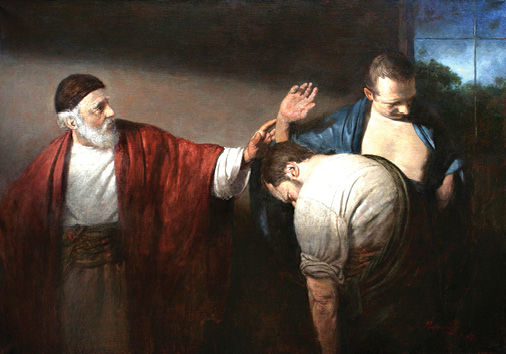[Jesus said,] “‘But what do you think? A man had two sons, and he came to the first and said, “Son, go, work today in my vineyard.” He answered and said, “I will not,” but afterward he regretted it and went. Then he came to the second and said likewise. And he answered and said, “I go, sir,” but he did not go. Which of the two did the will of his father?’ They said to Him, The first. Jesus said to them, ‘Assuredly, I say to you that tax collectors and harlots enter the kingdom of God before you. For John came to you in the way of righteousness, and you did not believe him; but tax collectors and harlots believed him; and when you saw it, you did not afterward relent and believe him.'” (Matthew 21:28-32)
Siblings often respond differently to the instructions of their parents. Such was the case in the “Parable of the Two Sons.” The father’s command (not a suggestion) was for these sons to work in his vineyard. The first son responded, “I will not.” The second son said, “I go, sir.”
If I had witnessed this exchange, my first impression would have been clear. The first son is an arrogant, disrespectful brat who does not obey the commandment, “Honor your father and your mother. . . .” The second son would be more to my liking—eager, willing, and respectful; even using the term “sir” in responding to his father.

All is not as it seems, however, for we are told that in the end, the first son regrets his initial disobedient response and goes to work after all, while the second son, in spite of his initial obedience and politeness, does not go to work at all. Jesus then poses this question to His audience, “Which of the two did the will of his father?” (verse 31)
It is helpful to know the context of this parable. Jesus was addressing an audience of chief priests and elders in the temple at Jerusalem. Jesus had recently driven out the moneychangers who had made God’s house a “den of thieves.” (Matthew 21:13) The Jewish leaders were interrogating Jesus in an attempt to trip Him up. They wanted to know by what authority Jesus had done these things in the temple.
In response to Jesus’ question about the sons, these temple leaders rightly answered that the first son had ultimately done his father’s will. Jesus uses their response to teach them an important lesson. He says to them, “Assuredly, I say to you that tax collectors and harlots enter the kingdom of God before you.” (verse 31)
The Jewish leaders were like the second son. They outwardly obeyed the Old Testament laws (and others they had added themselves), and gave lip service to the God of Moses. However, they were as those spoken of in Isaiah 29:13, “These people draw near with their mouths and honor Me with their lips, but have removed their hearts far from Me.” They believed that their public piety was what would save them, while at the same time they rejected the promised Savior pointed to by John the Baptizer, “Behold! The Lamb of God who takes away the sin of the world!” (John 1:29)
Conversely, it was the tax collectors and harlots who were like the first son. They had openly led lives in sinful opposition to God’s will. But many of them believed John’s message of forgiveness in Christ. In their contriteness, they were convinced of their own inability to save themselves.
Let us all learn from this parable, regardless of our previous walks in life, to trust in Jesus’ righteousness to cover our sins. God wants our hearts, not our hollow lip service.
All righteousness by works is vain, the Law brings condemnation; True righteousness by faith I gain, Christ's work is my salvation. His death, that perfect sacrifice, has paid the all-sufficient price: In Him my hope is anchored.(TLH 375:4)
is a professor at Immanuel Lutheran College in Eau Claire, Wisconsin.


